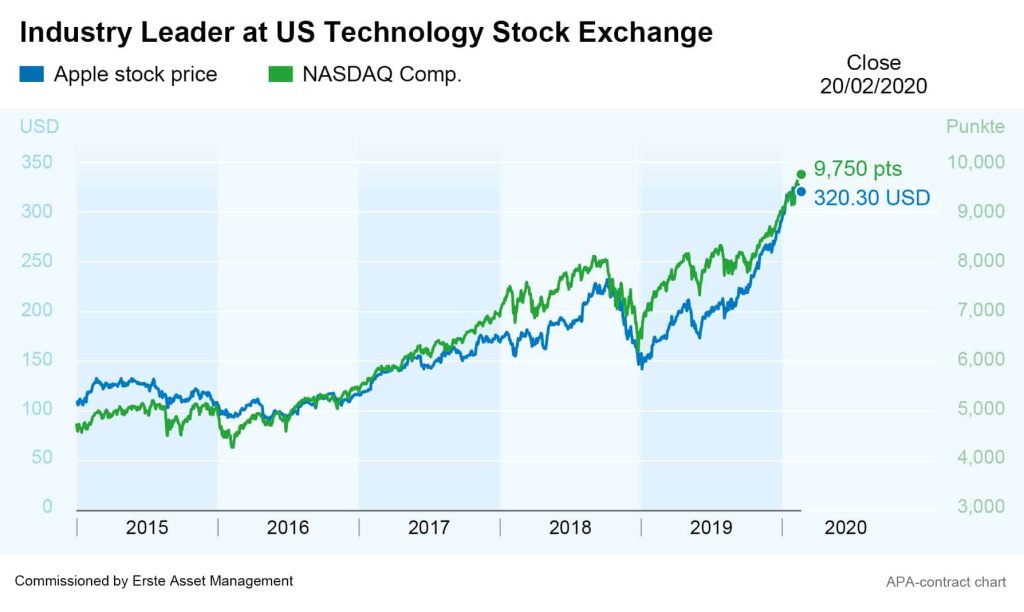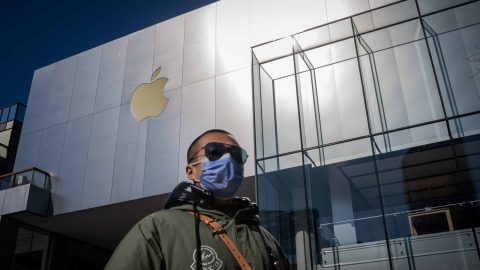
The coronavirus’s spread is currently the defining topic on the financial markets. By mid-February, specific effects on corporations worldwide and global trade were already apparent, with US electronics corporation Apple causing a stir in that regard last week.
The company announced that it would miss its sales targets for Q1 of 2020. Just three weeks earlier, the iPhone manufacturer had estimated the its sales in Q1 in the USD 63–67bn range (after USD 58bn in the same quarter last year). A new forecast was not released.
Demand and supply chains affected
Stock exchanges around the world initially reacted to the sales warning with clear losses, as Apple is considered a particularly relevant industry player and its shares are a driving force behind the US technology exchange NASDAQ.
However, the leading indices were able to quickly recoup the losses caused by the renewed uncertainty and, as in the case of the German DAX, soon returned to flying high. However, the situation remains tense today and prices are volatile.
Market observers nevertheless fear that the economic effects of the corona epidemic could make themselves felt medium-term. This is because a number of suppliers, other technology giants and industries with a strong dependence on China could follow Apple’s example.
On the one hand, the measures taken to contain the virus have led to supply chains being disrupted by temporary factory shutdowns, resulting in some unmet demand. On the other hand, many shops in China were left closed, which has had a significant impact on sales in this important market. Apart from electronics companies, this also impacted luxury goods manufacturers, for which China is a key growth region. Adidas, the second largest sporting goods manufacturer in the world, reported a drop in business in China of around 85 per cent since Chinese New Year on January 25.

Austrian companies feeling the effects of coronavirus responses
In addition, two dozen trade shows and industry conferences, such as the Beijing Motor Show and the world’s largest mobile phone show MWC in Barcelona, have been cancelled, potentially delaying business worth billions.
Styrian PCB manufacturer AT&S announced that all three of its production facilities in China are now back in operation. Nevertheless, the listed company has lowered its sales forecast for the fiscal year 2019/20 from EUR 1.03bn to EUR 960m. The margin expectations for earnings before interest, depreciation and taxes (EBITDA) have been reduced from previously 20 to 25 per cent to 18 to 20 per cent.
Measures for economic stimulation in sight, but no quick end to the epidemic
Meanwhile, in Asia, calls for state economic aid have become louder. In a cabinet meeting, South Korea’s president called for all possibilities to be considered. The Singapore government wants to cushion the effects on the labour market and the cost of living by leveraging funds to the tune of EUR 3.7bn. A further EUR 530m are scheduled to go to the health sector.
Hong Kong is also increasing its aid to cushion the effects of the epidemic on the economy. According to a leading Chinese expert, the situation around the virus may not stabilise until late April: “That is a very rough estimate,” said Zhong Nanshan, head of the Chinese government’s expert group. The outbreak throughout the country is expected to peak by the end of February. “But reaching the peak does not mean the turning point,” the physician cautioned.
Our dossier on coronavirus with analyses: https://blog.en.erste-am.com/dossier/coronavirus/
Legal note:
Prognoses are no reliable indicator for future performance.
Legal disclaimer
This document is an advertisement. Unless indicated otherwise, source: Erste Asset Management GmbH. The language of communication of the sales offices is German and the languages of communication of the Management Company also include English.
The prospectus for UCITS funds (including any amendments) is prepared and published in accordance with the provisions of the InvFG 2011 as amended. Information for Investors pursuant to § 21 AIFMG is prepared for the alternative investment funds (AIF) administered by Erste Asset Management GmbH pursuant to the provisions of the AIFMG in conjunction with the InvFG 2011.
The currently valid versions of the prospectus, the Information for Investors pursuant to § 21 AIFMG, and the key information document can be found on the website www.erste-am.com under “Mandatory publications” and can be obtained free of charge by interested investors at the offices of the Management Company and at the offices of the depositary bank. The exact date of the most recent publication of the prospectus, the languages in which the fund prospectus or the Information for Investors pursuant to Art 21 AIFMG and the key information document are available, and any other locations where the documents can be obtained are indicated on the website www.erste-am.com. A summary of the investor rights is available in German and English on the website www.erste-am.com/investor-rights and can also be obtained from the Management Company.
The Management Company can decide to suspend the provisions it has taken for the sale of unit certificates in other countries in accordance with the regulatory requirements.
Note: You are about to purchase a product that may be difficult to understand. We recommend that you read the indicated fund documents before making an investment decision. In addition to the locations listed above, you can obtain these documents free of charge at the offices of the referring Sparkassen bank and the offices of Erste Bank der oesterreichischen Sparkassen AG. You can also access these documents electronically at www.erste-am.com.
Our analyses and conclusions are general in nature and do not take into account the individual characteristics of our investors in terms of earnings, taxation, experience and knowledge, investment objective, financial position, capacity for loss, and risk tolerance. Past performance is not a reliable indicator of the future performance of a fund.
Please note: Investments in securities entail risks in addition to the opportunities presented here. The value of units and their earnings can rise and fall. Changes in exchange rates can also have a positive or negative effect on the value of an investment. For this reason, you may receive less than your originally invested amount when you redeem your units. Persons who are interested in purchasing units in investment funds are advised to read the current fund prospectus(es) and the Information for Investors pursuant to § 21 AIFMG, especially the risk notices they contain, before making an investment decision. If the fund currency is different than the investor’s home currency, changes in the relevant exchange rate can positively or negatively influence the value of the investment and the amount of the costs associated with the fund in the home currency.
We are not permitted to directly or indirectly offer, sell, transfer, or deliver this financial product to natural or legal persons whose place of residence or domicile is located in a country where this is legally prohibited. In this case, we may not provide any product information, either.
Please consult the corresponding information in the fund prospectus and the Information for Investors pursuant to § 21 AIFMG for restrictions on the sale of the fund to American or Russian citizens.
It is expressly noted that this communication does not provide any investment recommendations, but only expresses our current market assessment. Thus, this communication is not a substitute for investment advice.
This document does not represent a sales activity of the Management Company and therefore may not be construed as an offer for the purchase or sale of financial or investment instruments.
Erste Asset Management GmbH is affiliated with the Erste Bank and austrian Sparkassen banks.
Please also read the “Information about us and our securities services” published by your bank.


